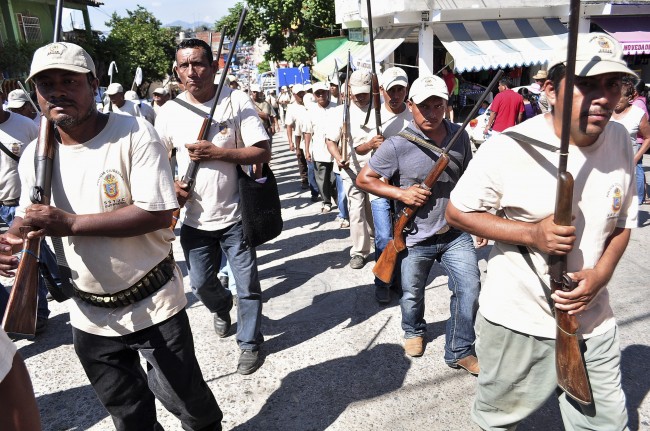By Brandon R. Cottrell
Impunity Watch Reporter, North America
MEXICO CITY, Mexico – After months of implicit cooperation with rural vigilantes, the Mexican government formally signed an agreement today, which will allow the vigilantes to gain legal status.

Under the agreement, the vigilantes, or so called “self-defense groups” will be temporarily incorporated into the Rural Defense Corps and will be subject to regulation by the Organic Law of the Mexican Army and Air Force. In incorporating with the Corps, the vigilantes will “cooperate with the troops activities being carried when they are asked to.”
Additionally, this agreement allows the vigilantes to join municipal police forces, which will allow them to protect their communities. Prior to joining such forces, however, the vigilantes must be approved by the applicable city council.
The vigilantes must submit a list of their members to the Defense Department. The vigilantes, who are heavily armed, may keep their weapons, provided that they register their weapons with the Defense Secretary prior to their individual incorporation. The military will, however, give the groups “all the means necessary for communications, operations and movement.”
Though the government has admirable goals in solving the nation’s security problems, the legalization of the vigilantes comes with plenty of risks. For example, consider that the government must enforce military discipline and instill respect for human rights and due process among more than 20,000 heavily armed civilians, then eventually disband them and send them back home.” Instilling such respect is likely to prove difficult, as the Mexican Army itself has been accused of human right abuses during the current “war against organized crime.”
Furthermore, in other Latin American countries were vigilantes were legalized, the vigilantes morphed into state-backed militias, which carried out “widespread human rights abuses [such as] mass killings.” For example in Guatemala, thousands of deaths were attributed to the army-backed Peasant Self Defense Patrols during the country’s civil war. Claudia Samayoa, a human rights activist in Guatemala, said that this “cure is going to be worse than the disease” and that “it would be better not to go down that road, and instead strengthen law enforcement and the justice and public safety systems.”
However, there is optimism in such an arrangement, as the vigilantes, prior to legalization, “have seized a dozen towns terrorized by extortion, killings and rapes at the hands of the cartel’s gunmen.” Additionally, the vigilantes are mostly pro-government and are dedicated to “ fighting against kidnapping, violence, and extortion by the cartels.”
For more information, please see the following:
AP News – Mexican Vigilante Legalization Plan Carries Risks – 28 Jan. 2014
Fox News Latino – Mexican Gov’t Signs Agreement With Vigilante Groups – 28 Jan. 2014
Guardian Liberty Voice – Mexico – Three Sided Vigilante Standoff – 28 Jan. 2014
Al Jazeera –Mexico Legalizes Vigilantes – 27 Jan. 2014


